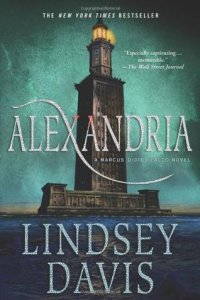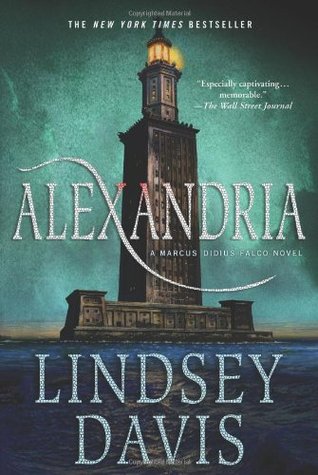“Alexandria” by Lindsey Davis
 As anyone knows, who’s stopped by this blog, I’m a sucker for anything set in Alexandria, especially during the Roman period. I’ve studied the city for many years and it’s the setting for my first novel. So I’m continuing my Alexandria series with this book review and giveaway. I’ll post some more history later in the month. Lindsey Davis is well known for her Marcus Didius Falco historical mysteries and this one is number nineteen in the series. From the back cover:
As anyone knows, who’s stopped by this blog, I’m a sucker for anything set in Alexandria, especially during the Roman period. I’ve studied the city for many years and it’s the setting for my first novel. So I’m continuing my Alexandria series with this book review and giveaway. I’ll post some more history later in the month. Lindsey Davis is well known for her Marcus Didius Falco historical mysteries and this one is number nineteen in the series. From the back cover:
“In A. D. 77 Marcus Didius Falco, private “informer” and stalwart Roman citizen, undertakes one of the most fearsome tasks known to man—he goes on vacation with his somewhat pregnant wife, Helena Justina, and their family. They travel to Alexandria, Egypt, and they aren’t there long before the Librarian of the great library is found dead under suspicious circumstances, in his office with the door locked from the inside.
Falco quickly finds himself on the trail of dodgy doings, malfeasance, deadly professional rivalry, more bodies, and the lowest of the low—book thieves! As the bodies pile up, it’s up to Falco to untangle this horrible mess before the killer begins to strike closer to home.”
This lighthearted description closely matches the tone of the book: modern attitudes and dialog set in ancient times. The concept of pater familias where the father is the head of the Roman house and holds (theoretical) powers of life and death over his wife, children and slaves is nonexistent in this book. Helena Justina is more than a full partner in this marriage, making key decisions not only on childrearing and running the household, but economic and employment decisions, as well. Falco, his wife, three children and brother-in-law descend on his uncle Fulvius “a negotiator.” The fact he has a male partner in life, as well as in business, causes no condemnation, furor or even comment, except as regards the partner’s party hosting skills.
This kind of writing can be a boon or a bane. There are heated debates, on several of the boards where I hang out online, on the “legitimacy” of using modern dialog and the extent to which modern attitudes throw the reader out of the story. I come down on the side that says whenever the story took place it was “modern” times to the characters. Before the advent of recording equipment, we have some evidence on the formal language people used when writing and giving speeches, but no way of knowing how people of various classes spoke to one another…especially in dead or archaic languages. As long as the author doesn’t use modern slang, I’m fine with modern prose.
Modern attitudes however, are a different story. Generally, I prefer my historical fiction to be accurate about attitudes towards family relationships, sex, government,religion, money, social roles, etc. These have changed over the years. That’s why I read historical fiction, to be transported to a different time and place. If a character holds “modern attitudes” or acts in a “modern way,” there has to be a good reason for their exceptionalism. A skilled author will make it seem natural, even inevitable, for that character, at that time, to think and act that way. The author has to show why this behavior is exceptional to the time and what the consequences are to the character of thinking and behaving in an unexpected way.
But I do make exceptions.
This book is funny. Yes, there are mysteries, bodies, and the occasional brush with death, but the reader knows (just as in their favorite Agatha Christie book or crime T.V. show) that the main characters will live to solve another mystery and crack another joke. It’s a formula that works, or this wouldn’t be the nineteenth in the series. Readers come back for the familiar characters, the well-researched history and the humorous writing. The humor, in this book, is based on the thesis that “human nature never changes”—the sneering society matron, the bored bureaucrat, the absent-minded professor, the perpetual student—are all familiar stereotypes and nothing in the story challenges our imagination about the past. The people are just like us with a bit of history and mystery thrown in. Here’s Falco’s assessment of his brother-in-law’s ambitions:
“Like all students, immediately his family thought he was finally settling down in a prestigious, extremely expensive university, he heard through some grapevine that there was better teaching at another one. Or better parties and the chance of a better love life, anyway…His father would pay for it. The senator, a diligent tolerant man, would just be thankful that Aulus had not—so far—expressed a wish to be a gladiator, a master forger or a writer of ten-scroll epic poetry.”
Because the setting of the murder is the famous Library on the grounds of the Museum, the most celebrated learning center in ancient times, we even have the benefit of a CSI-like autopsy and specialists in poison and mechanics. Scholars at the Museum and Library are secretive with their research, jealous of each others’ favor and united only in their contempt for the Museum’s administration. One of my favorite scenes is a back-biting academic board meeting which could have taken place in my former place of employment.
And if the reader gets a dose of history, while enjoying the mystery? Great! Davis provides a wonderfully researched book with lots of details on food, clothing, geography, architecture, and the state of science. Because I’ve researched Alexandria for my books and other blog posts, I had an eagle eye out for errors. I found nothing of any significance. So, if you’re interested in a fun read where you might inadvertently learn something, this book is for you. Don’t worry about it being part of a series; it stands on its own, just fine.
Lindsey Davis answers readers questions in this video about her writing and books:
The details:
- Title: Alexandria: A Marcus Didius Falco Mystery
- Author: Lindsey Davis
- Publisher: Minotaur Books, 2009
- Format: Trade paperback, 349 pages
- Price: $14.99
The giveaway (sorry, US and Canada only, due to shipping costs):
This is a gently used, once read copy, in like new condition. Entry is easy: leave a comment on this post (make sure to give your email when asked, but not necessary in the post). If you want a second entry, sign up to follow the blog or indicate you’re already a follower. For a third chance, repost this giveaway on your Facebook, blog, Twitter, website, etc. and post the link in your comment. Don’t worry if your comment doesn’t appear immediately, because I moderate comments and don’t spend my life at my computer. I’ll randomly select a winner and announce it on Wednesday, June 15 Good luck!
And the winner is:
Carol Wong!

I’ve loved Lindsey Davis for years. I’d missed this new one, so thanks for the heads up! You’ve peaked my interest in another way also when you mentioned heated debate on several of the boards you hang out on online about the role of modern dialog in historical fiction. Those sound like fascinating spots to visit on the web. Do you mind listing some of the links?
My three favorites for historical fiction are Historical Fiction Online, Library Thing’s Historical Fiction group and GoodRead’s Historical Fictionistas group…although I haven’t seen any specific thread on this topic at the latter. All also have writer’s forums where I hang out. In fact, I probably spend too much time hanging out online!
Thanks so much! I participate in the Goodreads group and Librarything, but I will definitely check out the other recommendation. I, too, spend far too much time chatting online, but it’s lots of fun.
The book sounds great, I love reading about Alexandria. From what you have read it sounds like a will learn some new facts about Alexandria while reading it!
Thanks for the review and giveaway! Historical fiction + mystery + good research = excellent read for me.
I’m an old GFC follower.
Or is it an e-mail follower? Either way, I follow the blog somehow because I saw the announcement for the giveaway.
I would love to read this fascinating book and hope to
learn something…..
Many thanks to you!
Cindi
I am an email subscriber to your blog…
Again, many thanks for the chance to win this
fascinating book!
Cindi
“Tweet!”
http://twitter.com/cmh512/status/76514806416424960.
Merci, Cindi
Would love to learn more about Alexandria!!!
Please enter me in this giveaway.
My Twitter name is Carolee888 and I tweeted:
http://faithljustice.wordpress.com/2011/06/01/book-review-alexandria/ Giveaway of “Alexandria”
CarolNWong(at)aol(dot)com
And Raffle King has declared the winner…Carol Wong! I’ll send you an email with the details. Thanks everyone!